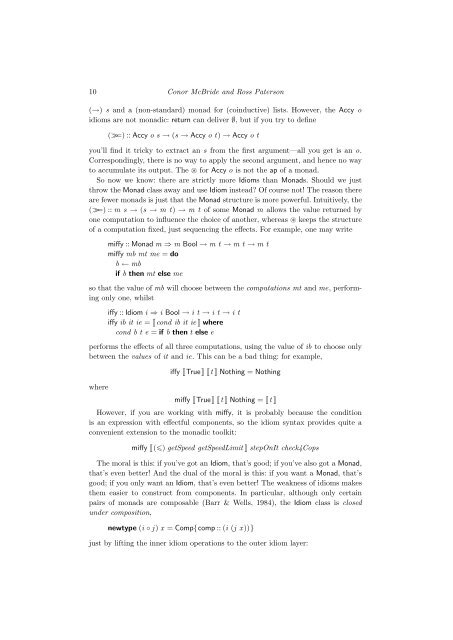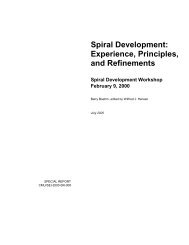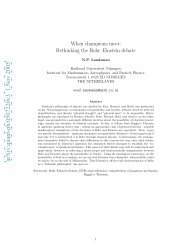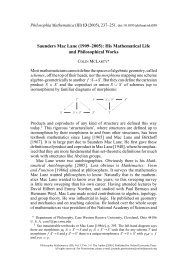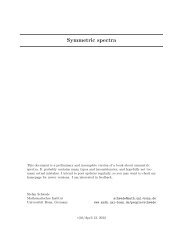Idiom
Idiom
Idiom
Create successful ePaper yourself
Turn your PDF publications into a flip-book with our unique Google optimized e-Paper software.
10 Conor McBride and Ross Paterson<br />
(→) s and a (non-standard) monad for (coinductive) lists. However, the Accy o<br />
idioms are not monadic: return can deliver ∅, but if you try to define<br />
( >=) :: Accy o s → (s → Accy o t) → Accy o t<br />
you’ll find it tricky to extract an s from the first argument—all you get is an o.<br />
Correspondingly, there is no way to apply the second argument, and hence no way<br />
to accumulate its output. The ⊛ for Accy o is not the ap of a monad.<br />
So now we know: there are strictly more <strong>Idiom</strong>s than Monads. Should we just<br />
throw the Monad class away and use <strong>Idiom</strong> instead? Of course not! The reason there<br />
are fewer monads is just that the Monad structure is more powerful. Intuitively, the<br />
( >=) :: m s → (s → m t) → m t of some Monad m allows the value returned by<br />
one computation to influence the choice of another, whereas ⊛ keeps the structure<br />
of a computation fixed, just sequencing the effects. For example, one may write<br />
miffy :: Monad m ⇒ m Bool → m t → m t → m t<br />
miffy mb mt me = do<br />
b ← mb<br />
if b then mt else me<br />
so that the value of mb will choose between the computations mt and me, performing<br />
only one, whilst<br />
iffy :: <strong>Idiom</strong> i ⇒ i Bool → i t → i t → i t<br />
iffy ib it ie = cond ib it ie where<br />
cond b t e = if b then t else e<br />
performs the effects of all three computations, using the value of ib to choose only<br />
between the values of it and ie. This can be a bad thing: for example,<br />
where<br />
iffy True t Nothing = Nothing<br />
miffy True t Nothing = t <br />
However, if you are working with miffy, it is probably because the condition<br />
is an expression with effectful components, so the idiom syntax provides quite a<br />
convenient extension to the monadic toolkit:<br />
miffy () getSpeed getSpeedLimit stepOnIt check4Cops<br />
The moral is this: if you’ve got an <strong>Idiom</strong>, that’s good; if you’ve also got a Monad,<br />
that’s even better! And the dual of the moral is this: if you want a Monad, that’s<br />
good; if you only want an <strong>Idiom</strong>, that’s even better! The weakness of idioms makes<br />
them easier to construct from components. In particular, although only certain<br />
pairs of monads are composable (Barr & Wells, 1984), the <strong>Idiom</strong> class is closed<br />
under composition,<br />
newtype (i ◦ j ) x = Comp{comp :: (i (j x))}<br />
just by lifting the inner idiom operations to the outer idiom layer:


